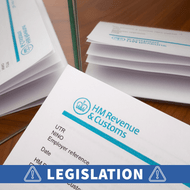HMRC Sets Sights on Online Sellers: What You Need to Know
Posted by Emma on 2nd Jan 2024 Reading Time:
The digital marketplace is facing a new era of tax scrutiny. Starting 1 January, HM Revenue & Customs (HMRC) will intensify its watch over earnings from online platforms like Amazon, Vinted, Airbnb, and eBay. This shift targets undeclared income, bringing numerous sellers into HMRC's focus. Those failing to comply with tax laws may face significant penalties.
 Coolcaesar, CC BY-SA 4.0, via Wikimedia Commons
Coolcaesar, CC BY-SA 4.0, via Wikimedia Commons
Dawn Register, BDO's tax dispute expert, highlights the shift: "The new rules, coming into force from January 2024, mean that this information will start to flow automatically – and globally." International adherence to OECD rules will compel platforms to report UK resident sellers' earnings to HMRC.
What's Changing?
Platforms will now gather detailed seller data, including personal identification and earnings. These requirements extend to smaller sites across various sectors. Robert Salter from Blick Rothenburg and Christine Cairns from PwC emphasise the implications for tax returns and compliance.
The Impact on Sellers
Current tax-compliant sellers will see minimal change. However, non-compliant individuals might face demands from HMRC. Register advises, "It will therefore be even more important for taxpayers to ensure they are accurately reporting their income from all sources." The £1,000 trading allowance remains, but earnings beyond this threshold require a tax return. Additionally, the rent-a-room scheme offers tax relief for Airbnb hosts.
Potential HMRC Actions
HMRC may issue 'nudge' letters or request voluntary income disclosures. Severe non-compliance could lead to audits or criminal charges. Notably, sales of personal items at a loss are exempt from tax.
Digital Platforms Adapting
Platforms like Amazon, Vinted, eBay, and Airbnb are preparing tools and guidance for sellers to navigate these changes. Gumtree, however, falls outside the scope of these rules.
The Bigger Picture
This development stems from the rapid evolution of the gig economy, with tax authorities now catching up. The OECD's guidelines and the growth of the global digital marketplace have precipitated these changes. Miruna Constantin from RSM UK notes, "The gig economy's transformation necessitates these regulations to address potential tax evasion."
Click here to learn more about the new reporting for gig economy workers.

